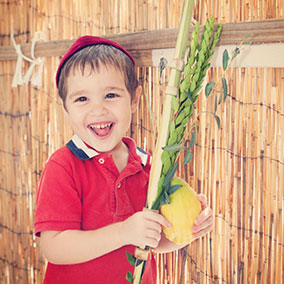Note to Parents: Exploring traditions from other cultures is one way to expand your family’s view of the world and cultivate a heart for the peoples that God loves. Learn about Sukkot (soo-KOHT), the Festival of Booths, an important holiday for Jews worldwide.
Sukkot is a week-long harvest festival that dates back to the time of Moses. God established Sukkot as a time for Israel to be thankful and remember His presence and provision during the 40 years they lived in the wilderness after leaving Egypt. Sukkot is also called the Festival of Booths because God commanded Israel to build and live in booths during this celebration. Sukkot is the Hebrew word for booths. These temporary shelters are reminders of Israel’s life in the wilderness. From October 14-20, modern-day Jews will observe Sukkot much as their ancestors did.
On the first day, family members work together to build a small tent-like structure in their yard, garden, or driveway. Families in apartments may build their booth on the balcony or up on the flat roof. Basic rules for constructing booths are based on God’s commands in the Old Testament book of Leviticus. The walls and roof must be made from plant-based materials like wood, bamboo reeds, sticks, palm and evergreen branches, or corn stalks. According to tradition, the roof must be thick enough to provide shade and shelter during the day, but have enough gaps for people to see the stars at night.
Children love helping decorate the inside of their booth with fall fruits and vegetables like pumpkins, squash, gourds, corn, and strings of cranberries or popcorn. Boys and girls also make handmade decorations like paper stars, birds, or colorful chains. Some booths even have rugs, tables, and chairs. During the weeklong festival, families eat meals in their booth and some even sleep there. How exciting to gaze up through the roof at night and remember that God cared for your ancestors who slept in the desert under the same starry skies.
Every morning of Sukkot, families attend a service at the local synagogue. They recite and sing passages from Psalms which praise God. Part of worship involves waving the lulav (LOO-lahv), a bundle of three kinds of tree branches and a yellow citron fruit that looks similar to a lemon. People wave the lulav in all four directions, then up and down. This represents God’s presence everywhere. At night during Sukkot, the Jewish community celebrates with singing and dancing.
Activities:
Build a booth with your family. Include materials from plants in your design. Decorate the inside with strings of popcorn, dried fruits, or paper chains. Eat an evening meal in your sukkah. Sleep in it, if possible. Talk about the difference between a temporary shelter and a permanent home. Pray that Jewish people will understand that God promises to give them an eternal home with Him in heaven when they trust is Jesus as their Savior.
Choose a passage used in morning worship during Sukkot (Psalms 113-118). Read it together as a family. Pray that Jewish people will recognize Jesus as their long-awaited messiah.
Pretend that you are holding a lulav. Using both hands, wave the bundle of branches and fruit in front of you, then to the left. Twist around to wave the lulav in back of you, then to the right. Lift you arms and wave it high. Now wave it low. Talk about how these movements demonstrate that God is everywhere. Pray for God to be near to Jewish families who seek Him.





